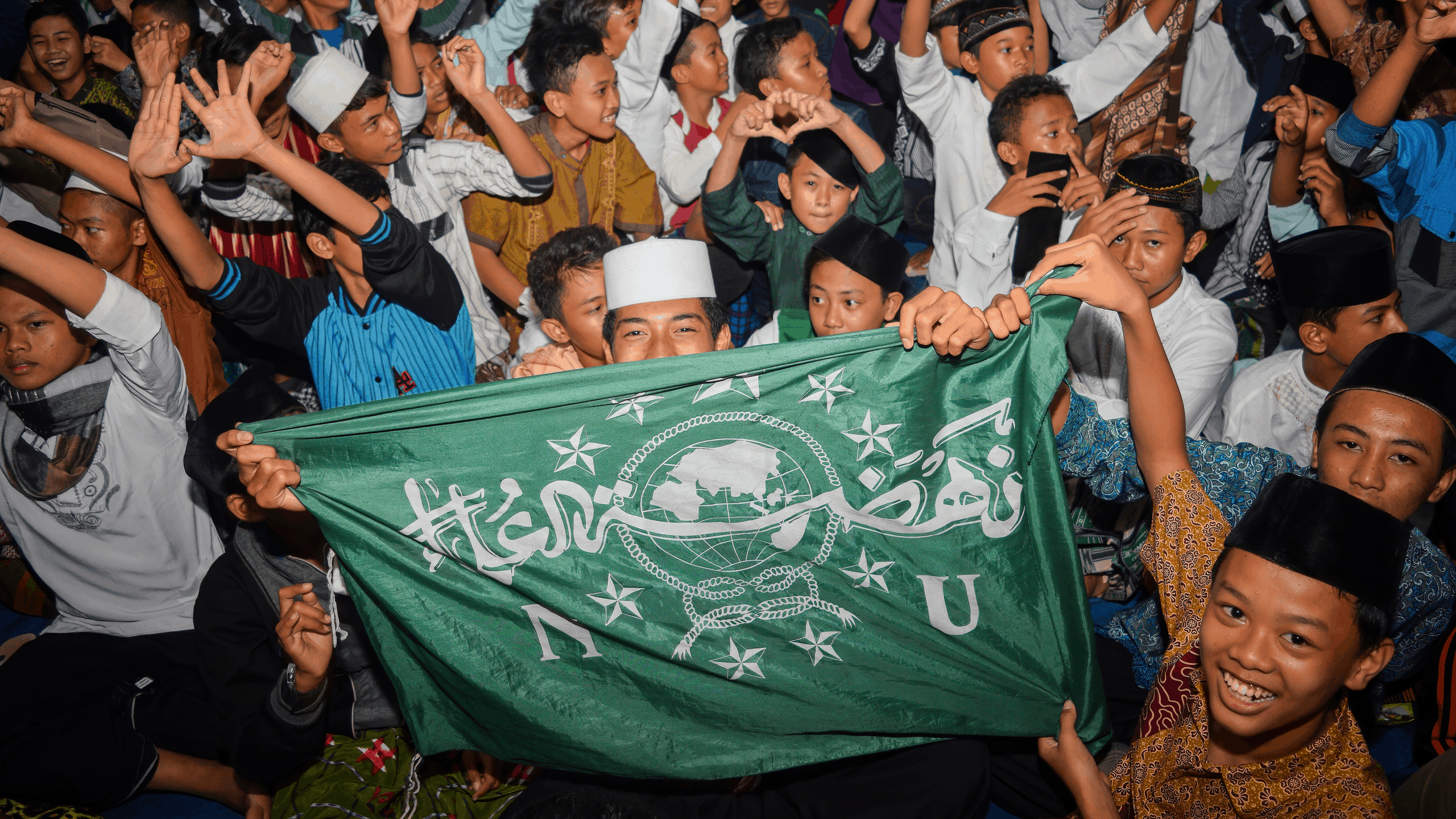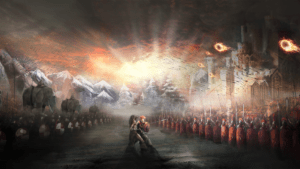Introduction to Da’wah
The Qurʾān and ʾaḥādīth instruct Muslims to conduct aggressive evangelism campaigns, called da’wah,1 with the intent of convincing non-Muslims to accept Islam as the only true religion. Scholars acknowledge da’wah as a mandate which applies to every Muslim individually, while simultaneously recognizing it as a collective obligation of the Muslim community.2 Muslim evangelism differs greatly from other religions, as da’wah also “includes the ‘commanding of good and forbidding of wrong,’ [Surah 3:104] both in Islamic societies and in non-Muslim-majority contexts.”3
External aspects of da’wah endeavor to enlarge Islam’s area of influence, while internal functions strive to strengthen the commitment of Muslims. Accordingly, the goal of Islam—through da’wah—is to convert whole societies to Islam, ultimately producing a worldwide Islāmic state (ummah). Sheik Abd al-‘Aziz bin Salih al-Jarbu underscores Islam’s long-term sociopolitical conflict, writing,
The battle with the disbelievers is a battle of beliefs. It is not a battle brought on by a dispute over some small piece of land, or language difference, or military buildups, or economics, or modern technology, or cultural progression, or any of these other banners that consistently rise and fall. In fact, it is not even due to their entity towards us! Rather, it is a battle based on belief and religion.4
Accordingly, most modern Muslim commentators focus on this political aspect of da’wah, recognizing the Islāmic mandate to integrate religion and politics into a comprehensive ideological system.5
Contemporary da’wah consists of three interconnecting areas of emphasis, including “conversion, Islamisation, and jihad.”6 Conversion methods are overt, attempting to convince non-Muslims to accept Islam using traditional evangelism approaches (e.g., using Islāmic literature and media). Conversely, Islamisation employs both overt and covert tactics, seeking to conform society and culture to Sharīʿah. Finally, the purpose of jihad is to impose Allāh’s ordinances globally, and some Islamists willingly engage in violent jihad as a means of facilitating and hastening da’wah.7
Da'wah through Conversion
Muslims refer to conversion as reversion, as Islāmic tradition teaches that every human is born Muslim, yet, many have gone astray in practicing false religions.8 Islāmic organizations allocate vast resources toward furthering da’wah operations, aiming to obtain converts through high-quality publications and media productions, missionary activities, and educational platforms. Being convinced of the truthfulness of Islam is inconsequential, as conversion takes place when a non-Muslim recites the šahādah—regardless of his or her motivation.9 As a result, Muslims often use coercion and deception tactics in performing da’wah, and material inducements (e.g., jobs, houses, monthly allowances) often persuade impoverished people to accept Islam.
For example, Cambodian converts purportedly receive $1000 upon reciting the šahādah and then receive a monthly stipend of $30-$50 for an undisclosed period.10 In Africa—where disease abounds, and medical care is sparse—Islamic organizations offer free health care, yet often withhold services unless the patient converts to Islam. Since Islam allows men to have up to four wives simultaneously, marriage provides another tool for conversion, as Muslim men actively seek to wed non-Muslim women. In African countries, Muslim men receive payment “for each Christin woman they marry, or at least impregnate; if they manage to marry a pastor’s daughter, their financial reward can be greater.”11 In Egypt, Muslim students conduct da’wah by employing methods of manipulation, sexual exploitation, and blackmail. Standard procedure is to sexually compromise Christian girls (typically between 9-15 years of age), “defiling them and humiliating them in front of their parents, thereby forcing them to flee their homes,” before presenting “conversion to Islam as a ‘solution’ for their problems.”12
Da'wah through Islamisation
Like adherents of other religions, Muslims within contemporary Western societies often privatize their religion; however, those who strongly emphasize the political aspects of Islam are often designated Islamists, maintaining an ideology referred to as Islamism.13 From its inception, Islam sought amalgamation between politics and religion, and Islāmic scholars recognize the theological underpinnings that require Muslims to impose Sharīʿah upon the entire world. If non-Muslim populations reject the call to conversion, Islamists intend to implement Allāh’s imperatives by subverting and transforming societies through intimidation and violence.14 Islamism maintains that establishment of the ummah is the only way to achieve stability, as peace is only possible under a global Islamic state, governed by Sharīʿah.15
While not all Muslims engage in violent activities for da’wah, a standard conviction exists that all Muslims are united in an international association that requires unanimous support against non-Muslims. Additionally, contemporary Islamist movements engage in civilizational jihad—a nonviolent effort, purposing to establish Islam as the dominant religion in non-Muslim-majority states.16 These organizations engage in institutional, legal, economic, educational, cultural, social, and welfare endeavors to reshape western civilizations, and establish an environment that is conducive to Islam.
Islamisation Methods
Islāmic leaders leverage mass Muslim migration and high birth rates as methods of fostering Islamization efforts in non-Muslim regions. Although many Muslims do not relocate with the intention of conducting da’wah internationally, religious leaders recognize the opportunity to revive Islam and increase its area of influence by capitalizing on migration. In fact, most Muslim countries regard large populations as a political weapon and often send citizens to settle in non-Muslim environments.17 Subsequently, the high birth rate of Muslim minorities helps to broaden the support base within non-Muslim-majority areas. In Europe, “even if immigration were to cease, a continued difference in birth rate would mean that the Muslim minorities would in time become majorities.”18
As Muslim populations increase, their communities quickly establish institutions dedicated to articulating and perpetuating Islāmic beliefs and values. Islamists use these organizations to represent Muslim views to the public and the governing authorities while petitioning for Muslim causes.19 When possible, Islamist movements attempt to exploit the democratic process, developing political parties to convert the population and parliamentary system internally. Motiur Rahman Nizami, the Jamaat-e-Islami party leader in Bangladesh, exemplifies this tactic in stating, “We are not in a hurry. We don’t expect anything to happen overnight, but pursue a slow but steady policy towards total Islamization of the country.”20
Obtaining political power is a key factor in instituting Sharīʿah—legislation that defines the Islāmic faith, and is fundamental for adhering to the will of Allāh. Contrary to the democratic systems of the West, Islam defines itself by submission and duties, not personal freedom and inherent human rights. As a result, Islam promotes an authoritarian system of government, where individual rights are “subordinate to the concept of duty within this Sharīʿah framework.”21 Within this hierarchical system, people are subordinate to the community, non-Muslims are subservient to Muslims, and women are inferior to men. For example, in cases where recompense is payable for injury, women receive less compensation than men for the same injury, and their testimony in court is worth half that of men.22
However, obtaining political power is not always feasible. In these situations, Islamists execute a strategy for gradual implementation of Sharīʿah within non-Muslim-majority states, by actively requesting policy and legislation changes in areas of “food, marriage, divorce, politics, policing, hospitals, prison, and banking.”23 For instance, Muslim organizations routinely demand the European government provide ḥalāl foods in prisons, schools, and hospitals.24 Superficially, this request appears benign; however, ḥalāl food regulations represent a mere fraction of Sharīʿah protocols concerning what is permissible (ḥalāl) and what is forbidden (ḥarām).25 Islamic scholars recognize Sharīʿah as obligatory to all humanity, thereby requiring Muslims to propagate ḥalāl and ḥarām protocols throughout non-Muslim-majority societies—a process that is beginning with ḥalāl foods.
Transformation of the consciousness of the population is the first step in the Islamisation process since the successful integration of Islam facilitates religious and political conversion. Within the West, politically correct multiculturalism greatly enhances this process. Publications about Islam often undergo sanitization and censorship to ensure omission of unpleasant features, ensuring offense does not result, while critics of Islam receive the labels of “Islamophobes,” “Orientalists,” and “Bigots.”26 Once Muslim influence increases, and organizations achieve legislative and political victories, Islamists organizations begin applying force to gain control of the society and establish an Islāmic state under Sharīʿah.27
Da’Wah through Jihad
Inevitable association exists between the doctrines of da’wah and jihad, as both pursue the propagation of Islam and establishment of a global ummah under Sharīʿah. Accordingly, Islamists occasionally refer to jihad as da’wah with force, explaining, “The purpose of offensive jihad [is] to eliminate all elements that are acting as obstacles for the rest of the people converting to Islam; this is because when the people will see the open system of Islam, and the peace that it brings, they will all willingly embrace Islam.”28 Formally recognizing the intimate connection between da’wah and jihad, a Dutch intelligence report states, “The choice of Dawa-oriented groups for non-violent activities does not always imply that they are non-violent on principle. Often, they simply do not yet consider armed Jihad expedient for practical reasons (Jihad can be counterproductive or impossible because of the other side’s superiority) or for religious reasons (the Jihad against non-believers is only possible when all Muslims have returned to the ‘pure’ faith).”29
Historians trace the execution of offensive jihad to Muhammad, acknowledging it as a conventional means of spreading Islam throughout history. “Only under severe constraints, when non-Islamic power was overwhelming, could the jihad imperative be put on hold for a while, for example, under Western colonial rule.”30 This ingrained tradition of warfare continues into the modern era, as radical groups wage a relentless campaign of terror against an assortment of international targets. Since violence is a predominant aspect of Islāmic tradition, even moderate Muslims typically condone violence against “infidels, apostates, those who criticize Muhammad, and others they would consider enemies of Islam.”31
In recent years, Islamists began attempting to create religiously pure countries, by intentionally displacing whole populations of non-Muslims. In Iraq—following the overthrow of Saddam Hussein in 2003—militant groups aggressively conducted kidnappings, assassinations, and bombings against indigenous Christians, successfully displacing about half the country’s Christian population.32 Similar campaigns actively occur in Syria, Nigeria, and Sudan, where non-Muslims receive the ultimatum to convert to Islam, flee their homeland, or suffer execution. Islāmic tradition allows Christians and Jews the fourth option of paying jizyah—an extortive tax, signifying their inferiority to Muslim citizens—thereby affording them protection under the Islāmic state.
In regions where Muslims remain the minority, Islamists seek to amass power, while destabilizing the government through indiscriminate attacks against civilians. Occasionally, violent protests and riots attempt to compel governments to accept Islāmic demands, while calculated assassinations seek to silence public criticism. In the West, the threat of violence creates an atmosphere of “excessive political correctness in self-censorship by non-Muslims”—effectively elevating Islam to a privileged position, void of criticism restraint.33
- This article is a précis of Patrick Sookhdeo, DAWA: The Islamic Strategy for Reshaping the Modern World (McLean, VA: Isaac Publishing, 2014), and only intends to serve as an introduction to Da'wah.
- Patrick Sookhdeo, DAWA: The Islamic Strategy for Reshaping the Modern World, (McLean, VA: Isaac Publishing, 2014), 15-16.
- Ibid., 2, 8.
- Quoted in Patrick Sookhdeo, DAWA: The Islamic Strategy for Reshaping the Modern World, 133.
- Patrick Sookhdeo, DAWA: The Islamic Strategy for Reshaping the Modern World, 12-13.
- Ibid., 4.
- Ibid., 3.
- Ibid., 1.
- Ibid., 1, 23.
- Ibid., 24.
- Ibid., 26.
- Ibid., 27.
- Ibid., 29.
- Ibid., 32.
- Ibid., 37.
- Ibid., 36.
- Ibid., 42.
- Ibid., 41.
- Ibid., 45.
- Quoted in Patrick Sookhdeo, DAWA: The Islamic Strategy for Reshaping the Modern World, 45.
- Patrick Sookhdeo, DAWA: The Islamic Strategy for Reshaping the Modern World, 46.
- Ibid., 47.
- Ibid., 49.
- Ibid., 55.
- Ibid., 54.
- Ibid., 57-60, 69-72, 77-81.
- Ibid., 72.
- Quoted in Patrick Sookhdeo, DAWA: The Islamic Strategy for Reshaping the Modern World, 118.
- Quoted in Patrick Sookhdeo, DAWA: The Islamic Strategy for Reshaping the Modern World, 118-119.
- Patrick Sookhdeo, DAWA: The Islamic Strategy for Reshaping the Modern World, 122.
- Ibid., 123.
- Ibid., 125.
- Ibid., 124.




